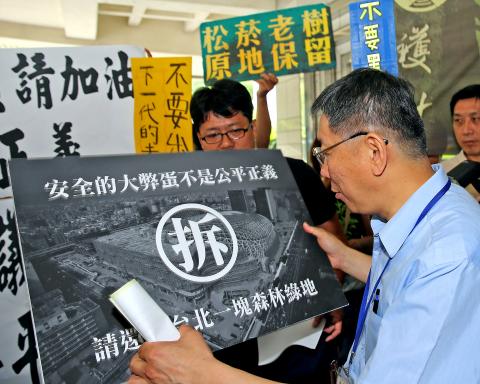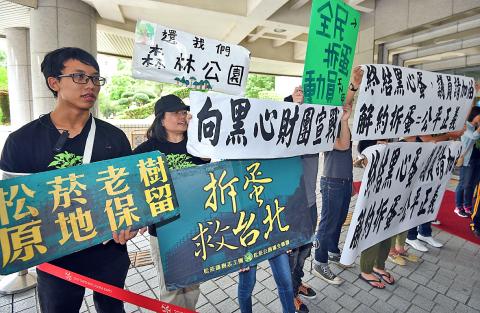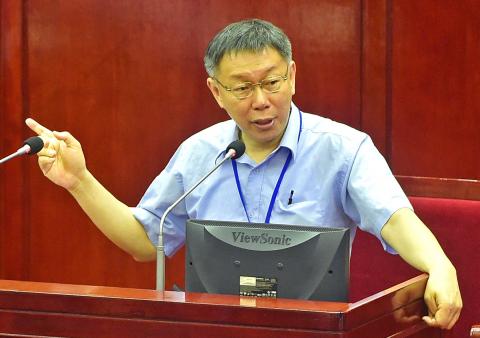Taipei Mayor Ko Wen-je (柯文哲) yesterday issued an ultimatum to Farglory Group (遠雄集團), saying that it has three months to comply with the Taipei City Government’s terms for continuing work on the construction of the Taipei Dome, before he moves to dissolve the build-operate-transfer contract with the developer.
Ko made the remarks during a report to the Taipei City Council, announcing a list of his demands to Farglory to be filed on Monday next week, comprising of seven safety-related items and 39 contract revisions.
The safety standard demands are to include a mandate for new safety evaluations of the site, as well as reductions in the size of the stadium’s commercial zone and its maximum occupancy, while the city also wants contractual revisions be made to 39 items that the Control Yuan had designated as improper.

Photo: CNA
In his report to city councilors, Ko also issued an apology to Taipei residents, saying: “I am sorry; I understand the public’s frustration, but I must insist on solving the situation now, so as to prevent the same problems from happening again.”
The city government had filed more than 300 documents to negotiate the continuation of the project in good faith, but Farglory spurned the city’s efforts by responding with delaying tactics and treating the dispute as an “essay-writing contest,” Ko said.
The Taiwan Architecture and Building Center (台灣建築中心) had not issued its approval of the stadium after a year-long fire safety evaluation of the structure and Farglory had failed to follow the approved blueprints, he said.

Photo: Liao Chen-huei, Taipei Times
Ko said that the city faces many challenges, including the “extremely unfavorable” terms of the original contract that enable Farglory to pay no more than NT$3 million (US$91,866) for not fulfilling its obligations, while mandating the city government to buy back the contract at an evaluated market price.
Ko said that the nation’s justice system has proved “erratic” and “unworthy of public trust,” in punishing bribery with a NT$200 million fine rather than a prison sentence, in an apparent snipe at Chao Teng-hsiung (趙藤雄), a former Farglory chairman who was convicted of bribery with his sentence suspended for five years and was fined NT$200 million, characterizing the ruling as “putting a price on justice.”
In response to questions from Chinese Nationalist Party (KMT) Taipei City Councilor Chin Huei-chu (秦慧珠), Ko said the city would not go to arbitration for the dispute, adding: “We will unilaterally dissolve the contract. If [Chao] is unhappy, he is free to litigate.”

Photo: Liao Chen-huei, Taipei Times
Ko told Republican Party City Councilor Hsu Shih-hsun (徐世勳) that in the absence of a resolution satisfactory to the city government, demolishing the stadium “remains an option.”
Farglory Dome Co general-manager Jacky Yang (楊舜欽) accused Ko of using public safety standards in a manner that is “tantamount to blackmail” and of violating the principles of “a nation of laws” by “trampling on a private enterprise.”
The city government has the right to unilaterally dissolve any freely entered contract, but Taipei residents should know that the ensuing litigation would result in liabilities that are substantially greater than the mutually agreed sum that was stipulated in the original contract, Yang said.

CHAOS: Iranians took to the streets playing celebratory music after reports of Khamenei’s death on Saturday, while mourners also gathered in Tehran yesterday Iranian Supreme Leader Ayatollah Ali Khamenei was killed in a major attack on Iran launched by Israel and the US, throwing the future of the Islamic republic into doubt and raising the risk of regional instability. Iranian state television and the state-run IRNA news agency announced the 86-year-old’s death early yesterday. US President Donald Trump said it gave Iranians their “greatest chance” to “take back” their country. The announcements came after a joint US and Israeli aerial bombardment that targeted Iranian military and governmental sites. Trump said the “heavy and pinpoint bombing” would continue through the week or as long

TRUST: The KMT said it respected the US’ timing and considerations, and hoped it would continue to honor its commitments to helping Taiwan bolster its defenses and deterrence US President Donald Trump is delaying a multibillion-dollar arms sale to Taiwan to ensure his visit to Beijing is successful, a New York Times report said. The weapons sales package has stalled in the US Department of State, the report said, citing US officials it did not identify. The White House has told agencies not to push forward ahead of Trump’s meeting with Chinese President Xi Jinping (習近平), it said. The two last month held a phone call to discuss trade and geopolitical flashpoints ahead of the summit. Xi raised the Taiwan issue and urged the US to handle arms sales to

State-run CPC Corp, Taiwan (CPC, 台灣中油) yesterday said that it had confirmed on Saturday night with its liquefied natural gas (LNG) and crude oil suppliers that shipments are proceeding as scheduled and that domestic supplies remain unaffected. The CPC yesterday announced the gasoline and diesel prices will rise by NT$0.2 and NT$0.4 per liter, respectively, starting Monday, citing Middle East tensions and blizzards in the eastern United States. CPC also iterated it has been reducing the proportion of crude oil imports from the Middle East and diversifying its supply sources in the past few years in response to geopolitical risks, expanding

Pro-democracy media tycoon Jimmy Lai’s (黎智英) fraud conviction and prison sentence were yesterday overturned by a Hong Kong court, in a surprise legal decision that comes soon after Lai was jailed for 20 years on a separate national security charge. Judges Jeremy Poon (潘兆初), Anthea Pang (彭寶琴) and Derek Pang (彭偉昌) said in the judgement that they allowed the appeal from Lai, and another defendant in the case, to proceed, as a lower court judge had “erred.” “The Court of Appeal gave them leave to appeal against their conviction, allowed their appeals, quashed the convictions and set aside the sentences,” the judges